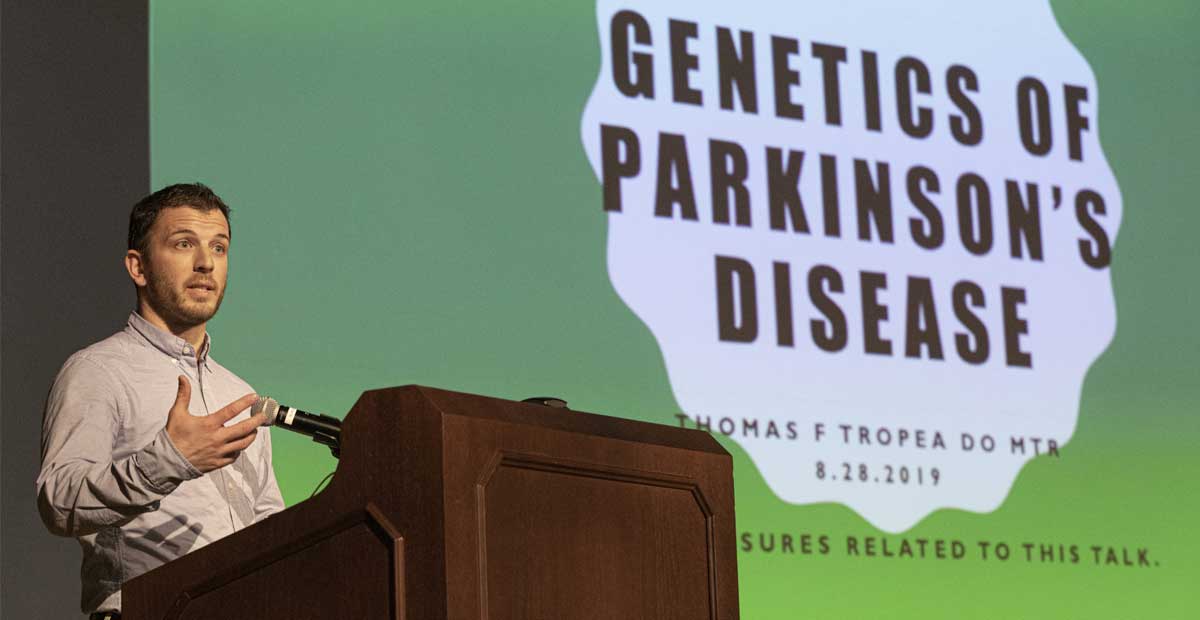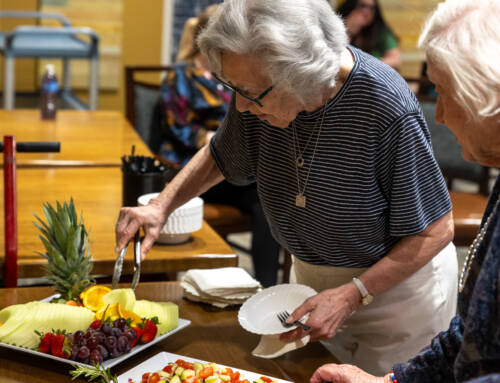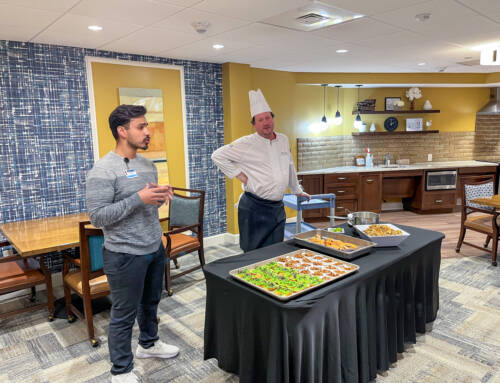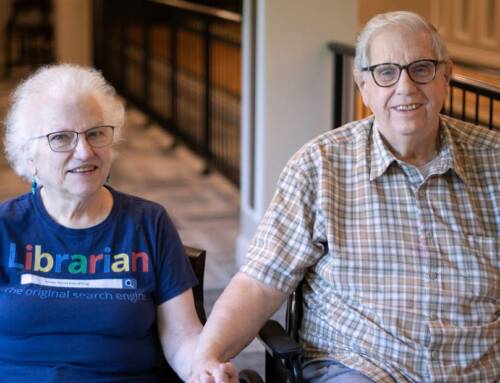Overview
This article is based on a presentation given at Masonic Village at Elizabethtown by Dr. Thomas Tropea, a neurologist, movement disorder specialist and assistant professor of Neurology at the Perelman School of Medicine, University of Pennsylvania. He specializes in Parkinson’s disease, particularly the genetics of Parkinson’s disease.
Approximately 1% of individuals age 65 and older, and 3 to 5% over age 85, develop Parkinson’s disease, a neurogenative disorder that affects dopamine production in the brain. As such, many people want to know what causes Parkinson’s. While it has both genetic and environmental factors, genetics is an important part of Parkinson’s disease.
What is Genetics?
Genetics is the study of genes. You receive your genetic material from your parents. Two types of genes exist: dominant and recessive. With dominant genes, you only need one copy of the gene to inherit its characteristics, while for recessive genes, both parents must be carriers to pass it on to a child. For example, brown eyes are a dominant trait and blue eyes are recessive. Genetics do not define us – and you can’t separate them from a person’s environment – but genes are like a blueprint, and they interact with each other. Everyone has variants, or changes in their DNA. However, not everyone has mutations, or variants that cause diseases like Parkinson’s.
How is Parkinson’s Disease Inherited?
People who have Parkinson’s or a family member with Parkinson’s often fear this puts them or their loved ones at higher risk. However, according to Dr. Tropea, “even having one family member with Parkinson’s, you’re at the same risk as everybody else.” Without downplaying the importance of genetics, know that age is the most common risk factor. In fact, only 15% of Parkinson’s patients have a family history of the disorder, according to the National Institute of Health.
Research has connected certain genes to Parkinson’s risk. GBA and LRRK2 are the most common genes for Parkinson’s. GBA does not directly cause Parkinson’s, but it makes a person five times more at risk. Five to 10% of individuals with Parkinson’s have the GBA gene. LRRK2 and SNCA are dominant genes, found in 1 to 2% of those with Parkinson’s. Conversely, DJI, PINKI and PKRN are recessive.
Clinical Genetic Research in Parkinson’s Disease
Doctors have started using “precision medicine” to treat Parkinson’s. It uses a person’s genetic information and “directs therapies based on predicted responses,” according to Dr. Tropea. New clinical trials for Parkinson’s disease, focused on the GBA, LRRK2 and DNL1 gene, are also occurring.
“It’s very, very different from the way we’ve run clinical trials before,” Dr. Tropea said. These use disease-modifying medications and target genetic pathways to slow down or stop disease progression. Researchers are also experimenting with gene therapy, which gives participants a healthy version of a defective gene.
Genetic Testing and Parkinson’s Disease
After reading about the different genes related to Parkinson’s, you may wonder if you have any of these genes. However, Dr. Tropea does not recommend going out and getting a genetic test from a direct-to-consumer brand like 23andme.
“There’s no easy way to find out if you’re genetically at risk. It’s probably a big waste of money,” he said.
If you’re going to get a genetic test, it’s better to go to the professionals. UPenn’s MIND (or Molecular Integration in Neurological Diagnosis) Initiative conducts genetic tests for the GBA and LRRK2 genes in Parkinson’s patients. The Parkinson’s Foundation’s PDGENEration program also provides free genetic testing and genetic counseling for Parkinson’s patients.
How is Masonic Villages Addressing Parkinson’s Disease?
While no one can change the genetics of Parkinson’s disease, Masonic Villages has programs in place to help those who already have it, their loved ones and those who may develop Parkinson’s. The Baird Wellness Center at Masonic Village at Elizabethtown offers an eight-week exercise class for people with Parkinson’s called “Move to Improve.” Attendees receive a pre- and post-class skills assessment and take-home exercises to increase their mobility and coordination.
“We focus a lot on their balance, how they walk and how they transfer. Essentially, we teach them how to walk again,” said Brooke Hoffsmith, wellness specialist, who teaches the class with Lydia Greinermiller, wellness specialist. “Even though it is natural for us to walk, people with Parkinson’s lose that ability. We learned at a young age it is a heel-to-toe strike, but they shuffle their feet, take really small steps and freeze in place, which is what causes falls.”
On the second Tuesday of each month, Masonic Village residents in Elizabethtown can attend the Supporting Parkinson’s group, which offers valuable information on nutrition and exercise for those with Parkinson’s. A caregivers support group meets on the fourth Monday of each month. (For more information on either program, review the latest Village Living magazine.) Masonic Village at Elizabethtown or Masonic Village at Sewickley residents can utilize home care services if they need them. Masonic Village at Elizabethtown also offers home health services to residents and community members.




